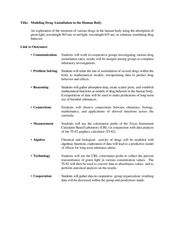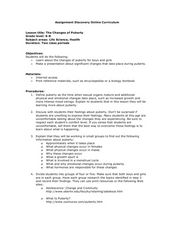Curated OER
Skeletal, Skin, and Muscular Systems
Eighth graders explain the functions of various body systems. Using a concept map, 8th graders identify and explain the fuctions of the skeletal, skin, and muscular systems of the body. After completing their concept map, students...
Curated OER
Where is Your Heart? What Does it Do?
Students identify size and general location of human heart, identify heart muscle, describe, in general terms, heart's basic function of pumping blood throughout body, and complete "Where is Your Heart" and "What Does My Heart Look...
Curated OER
Body Systems
Young scholars view a video, they summarize the function or job of each body system. They are asked why is it important that athletes in training or a person who wants to tone muscles or stay healthy should comprehend how the systems...
Curated OER
The Food Pyramid and the Human Body
Third graders explore the digestive system. In this food pyramid instructional activity students investigate the food pyramid. Students make connections between eating healthy and how it makes them feel.
Curated OER
Variation in Human Skin Color
Students explore factors that control variation in human skin color and the implications of this information for human society. They understand that skin color is no longer considered a credible scientific standard by which to classify...
Nemours KidsHealth
Puberty: Grades 3-5
With puberty comes lots of changes to one's body. Scholars explore those changes with two lessons that examine the role of the pituitary gland and hormones. In the first lesson, pupils take on the role of the pituitary gland, write a...
Purdue University
Design of an Earthen Dam for a Lafayette Neighborhood
How do dams support bodies of water? Scholars engage in a hands-on STEM activity where they design, build, and test dams to learn about bodies of water and how humans use natural resources. They learn how criteria and constraints affect...
Curated OER
Pregnancy, Day 1: The Developing Baby
Twenty-six pages of good information about pregnancy. Pictures and descriptions describe the moment the sperm and egg unite, and there are worksheets that students can complete. This is a pretty comprehensive lesson plan for one day. It...
University of Minnesota
Makes Me Sweat
Never let them see you sweat ... unless you can't help it! Scholars design an experiment to determine the effects of stress on the body. They monitor sweat production under different conditions and relate the response to the function of...
Science Matters
Hierarchy
A system is only as good as the sum of its parts! Young scholars explore the components of the different body systems using a hands-on lesson. The lesson helps learners build an understanding that there is a hierarchy of components in...
Science Matters
Excretory System
Not a waste of time or energy! Introduce young scholars to one of the waste eliminating systems of the body in a hands-on instructional activity exploration. The 14th instructional activity in a 21-part series asks groups to build models...
Cengage Learning
COVID-19: What Can I Do?
Eleven slides make up a presentation that details the importance of practicing social distancing and what can be done at home during the COVID-19 pandemic. Scholars take part in the classroom discussion highlighting topics such as...
Nemours KidsHealth
Food Allergies: Grades 6-8
Over two lessons, scholars use articles and discussions to define what a food allergy is and identify the most common food allergens. Small groups prepare a skit showcasing how the body exhibits an allergic reaction. Learners examine...
Baylor College
It Begins with the Heart
Aspiring anatomists label a photograph of a human heart by comparing it to a colored diagram on the same page. The video that is mentioned in the procedure does not seem to be available, but the overview provides plentiful background...
Baylor College
The Heart is a Pump
Circulate this news: the heart is a pump containing one-way valves! Following the previous lesson on the external structure of the heart, learners now take a look at the inside. They use a three-color diagram to label a black-and-white...
Baylor College
How Much Water Do Humans Need?
Physical or life science learners measure the amounts of water eliminated by intestines and the urinary system, and the amounts lost via respiration and perspiration. In doing so, they discover that the body's water must be replenished...
Curated OER
The Human Organism
Students identify their feelings and learn constructive ways of handling conflict. In this human mental health instructional activity, students identify their feelings, learn how to tell others about their feelings, and learn how to...
Curated OER
Your Body's Building Blocks
Pupils study the elements of the Periodic Table as they relate to the building blocks of the body. They experiment to measure the amount of iron in the body.
Curated OER
I Am A Rock, I Am An Island: Describing Landforms and Bodies of Water
Students identify common landforms and bodies of water from descriptions of distinguishing features. In this landforms and bodies of water lesson plan, students describe the features they see in the pictures given to them.
Curated OER
Modeling Drug Assimilation in the Human Body
Students investigate the accumulation of drugs in the body. In this algebra instructional activity, students collect data on drug retention and assimilation. They use their data to predict the behavior and effects of drugs.
Curated OER
The Changes of Puberty
Young scholars study about the changes of puberty for boys and girls. In this health lesson, students study how the body changes during puberty and make a presentation about a significant change that can take place during puberty and how...
Curated OER
Smart Ideas Lesson Plan
Seventh graders create a concept map about the cardiovascular system. In this life science lesson, 7th graders identify the parts and functions of each system component. They explain how cardiovascular system works with other systems in...
Curated OER
Teaching Awareness of Human Development
Students examine the process of human development and identify the reasons for a good nights sleep. Individually, they write a list of the situations in their lives which are stressful. As a class, they discuss myths about stress and...
Curated OER
Life Processes and Living Things-Humans and Other Animals
In this fill in the blank worksheet, students respond to 20 short answer questions by identifying foods that contain large amounts of sugar, carbohydrate, and fruit acids and explaining their effects on the body.
Other popular searches
- Human Body Parts Pictures
- Human Biology
- Human Body Anatomy
- Human Body Systems
- Human Body Parts
- Human Body Systems Diagram
- Human Anatomy
- Human Body Bones
- Human Body Anatomy Sketching
- Human Body System Handouts
- Human Biology Organ Systems
- Human Body Grade 2























